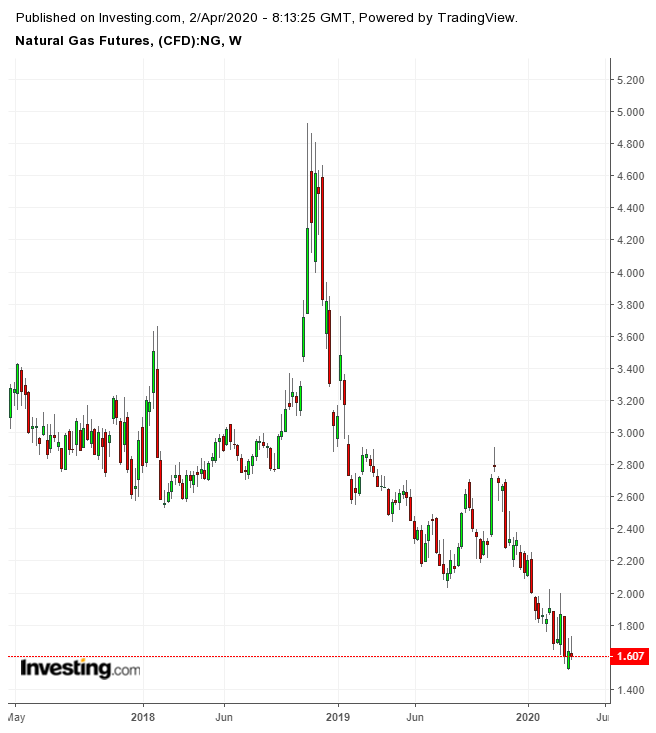Five cents — that’s what U.S. natural gas’ average daily range has been over the past week, after the gyrations of mid-March, as traders wonder if there’ll be any reprieve for the market in a seasonably lean period for demand.
Gas prices are bobbing not far from 25-year lows hit on March 23 as production remains higher than necessary in a nation where lockdown measures to contain the coronavirus outbreak have slashed commercial demand for heating, leaving domestic consumption as the only source of prop.

Spring has, meanwhile, arrived, bringing temperatures that will only get less chilly and warmer in the coming weeks — creating comfortable environments where the need for neither heating nor air-conditioning will be great.
This isn’t a season where gas prices typically do well and economic disruptions from COVID-19 are only making them worse.
Data showed gas production in the lower 48 U.S. states averaging 92.92 billion cubic feet per day last week, just slightly lower than the 93.59-bcfd average recorded in the previous week to March 20.
In a situation where gas drilling rigs don’t get cut fast enough to reduce the supply landing on the market, the other hope will be that more drillers go belly up — forcing abrupt disruption to production.
More Shale Drillers Could Go Bust In Q2
Bankruptcies in the U.S. oil patch are expected to gain momentum in the second quarter, accelerating as some drillers are forced to shut in production amid reduced oil demand and low available storage capacity, Buddy Clark, a partner and co-chair of energy practice group at Haynes & Boone told the Wall Street Journal.
A number of oil and gas companies, including Chesapeake Energy (NYSE:CHK), Ultra Petroleum (OTC:UPLC), and California Resources (NYSE:CRC), have either warned they may not stay current on their debts or hired restructuring advisers to negotiate with creditors.
“With the implications of COVID-19 still unraveling, gas bulls continue to monitor news from U.S. producers on how they’re managing the new reality of widespread anemic demand and historically low oil prices. Every day, a new slate of producers are announcing plans to dramatically cut spending and activity,” Leticia Gonzales at naturalgasintel.com wrote in a commentary on Wednesday.
Gonzales adds:
“It’s still early in the game. Although dozens of exploration and production companies have made major changes to their budgets and production outlooks, several more announcements lie ahead. Furthermore, guidance is far from set in stone.”
On Wednesday, Whiting Petroleum (NYSE:WLL), one of the largest drillers in North Dakota’s Bakken Shale, filed for bankruptcy protection, becoming the first sizable fracking company to succumb to the COVID-19 induced oil price crash.
But Whiting Petroleum — as its name suggests — is primarily an oil producer which generates gas as a by-product. The driller produced 3.4 million barrels of oil and 10.2 million metric cubic feet of natural gas in 2019, according to Colorado Oil and Gas Conservation Commission records.
Whitin's gas volume is minuscule compared to the 2.6 billion cubic feet produced per day by Chesapeake Energy (NYSE:CHK), the second largest U.S. gas driller which operates from the Rockies to Texas to Pennsylvania.
But Fewer Gas-Focused Bankruptcies Could Complicate Matters
Aside from Chesapeake, the other four big gas U.S. producers include oil majors Exxon Mobil (NYSE:XOM) and BP (NYSE:BP), as well as Anadarko and Devon Energy (NYSE:DVN) — all of whom aren’t really in dire straits at the moment.
That narrows the immediate prospects for gas-focused bankruptcies and could leave the market not far from its current range of $1.58 to $1.63 per million metric British thermal units as it waits out data on gas stockpiles over the next few weeks.
In Wednesday’s session, the front-month gas contract on the New York Mercantile Exchange’s Henry Hub fell 5 cents, or 3%, to $1.59 per mmBtu.
The drop came despite expectations that the U.S. Energy Information Administration will issue 10:30 AM ET (14:30) today a relatively better gas storage report for the week ended March 27 compared to the prior March 20 week.
Analysts tracked by Investing.com called for a draw of 24 bcf from storage for last week, compared with an increase of 6 bcf during the same week a year ago and the five-year (2015-2019) average withdrawal of 19 bcf for the period.
Disclaimer: Barani Krishnan does not own or hold a position in the commodities or securities he writes about.
